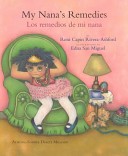
A little girl tells how her grandmother makes special teas and warm drinks for her and her little brother when they are not feeling well.
See the review at WOW Review, Volume 3, Issue 2

A little girl tells how her grandmother makes special teas and warm drinks for her and her little brother when they are not feeling well.
See the review at WOW Review, Volume 3, Issue 2
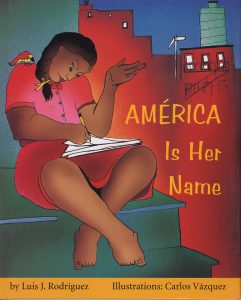 Set in the Pilsen barrio of Chicago, this children’s picture book gives a heartwarming message of hope. The heroine, Amrica, is a primary school student who is unhappy in school until a poet visits the class and inspires the students to express themselves creatively-in Spanish or English. Amrica Is Her Name emphasizes the power of individual creativity in overcoming a difficult environment and establishing self-worth and identity through the young girl Amrica’s desire and determination to be a writer. This story deals realistically with the problems in urban neighborhoods and has an upbeat theme: you can succeed in spite of the odds against you. Carlos Vzquez’s inspired four-color illustrations give a vivid sense of the barrio, as well as the beauty and strength of the young girl Amrica.Luis J. Rodrguez grew up in Watts and East L.A. His bestselling memoir about gang life, Always Running (now available in paperback in both English and Spanish from Touchstone Books), won the Carl Sandburg Award. His Poems Across the Pavement (Ta Chucha Press) won the Poetry Center Book Award from San Francisco State University, and his poetry collection, The Concrete River was awarded the 1991 PEN Oakland/Josephine Miles Award for Poetry. Mr. Rodrguez has worked extensively with gang members to guide them in positive directions, and he is frequently featured as a keynote speaker or guest poet at national conferences and cultural centers. Rodrguez explores the Chicano experience with an unrelenting, socially conscious eye that moved Larry Weintraub of the Chicago Sun-Times to call him a poet “we need to hear.”Illustrator Carlos Vzquez was born in Mexico, studied physics and art, and now teaches in adult education programs in New York City.This book is also available in a Spanish language edition as La llaman Amrica translated by Tino Villanueva. 1-880684-41-1
Set in the Pilsen barrio of Chicago, this children’s picture book gives a heartwarming message of hope. The heroine, Amrica, is a primary school student who is unhappy in school until a poet visits the class and inspires the students to express themselves creatively-in Spanish or English. Amrica Is Her Name emphasizes the power of individual creativity in overcoming a difficult environment and establishing self-worth and identity through the young girl Amrica’s desire and determination to be a writer. This story deals realistically with the problems in urban neighborhoods and has an upbeat theme: you can succeed in spite of the odds against you. Carlos Vzquez’s inspired four-color illustrations give a vivid sense of the barrio, as well as the beauty and strength of the young girl Amrica.Luis J. Rodrguez grew up in Watts and East L.A. His bestselling memoir about gang life, Always Running (now available in paperback in both English and Spanish from Touchstone Books), won the Carl Sandburg Award. His Poems Across the Pavement (Ta Chucha Press) won the Poetry Center Book Award from San Francisco State University, and his poetry collection, The Concrete River was awarded the 1991 PEN Oakland/Josephine Miles Award for Poetry. Mr. Rodrguez has worked extensively with gang members to guide them in positive directions, and he is frequently featured as a keynote speaker or guest poet at national conferences and cultural centers. Rodrguez explores the Chicano experience with an unrelenting, socially conscious eye that moved Larry Weintraub of the Chicago Sun-Times to call him a poet “we need to hear.”Illustrator Carlos Vzquez was born in Mexico, studied physics and art, and now teaches in adult education programs in New York City.This book is also available in a Spanish language edition as La llaman Amrica translated by Tino Villanueva. 1-880684-41-1
 From the Bellybutton of the Moon is renowned poet Francisco X. Alarcon’s fresh collection of 22 bilingual poems inspired by his touching recollections of childhood summers in Mexico. With a poet’s magical vision, Alarcon takes us back to his childhood when he traveled with his family to Mexico to visit his grandma and other relatives. We travel with him in the family station wagon, across the misty mountain range to the little town of Atoyac. There, in the beloved town of his ancestors, we hear his grandma’s stories, sample Auntie Reginalda’s tasty breakfasts, learn about the keys to the universe, and take playful dips in the warm sea. The lighthearted illustrations of Maya Christina Gonzalez perfectly capture the spirit of a summer in Alarcon’s Mexico where “colors are more colorful, tastes are tastier, and even time seems to slow down.”
From the Bellybutton of the Moon is renowned poet Francisco X. Alarcon’s fresh collection of 22 bilingual poems inspired by his touching recollections of childhood summers in Mexico. With a poet’s magical vision, Alarcon takes us back to his childhood when he traveled with his family to Mexico to visit his grandma and other relatives. We travel with him in the family station wagon, across the misty mountain range to the little town of Atoyac. There, in the beloved town of his ancestors, we hear his grandma’s stories, sample Auntie Reginalda’s tasty breakfasts, learn about the keys to the universe, and take playful dips in the warm sea. The lighthearted illustrations of Maya Christina Gonzalez perfectly capture the spirit of a summer in Alarcon’s Mexico where “colors are more colorful, tastes are tastier, and even time seems to slow down.”
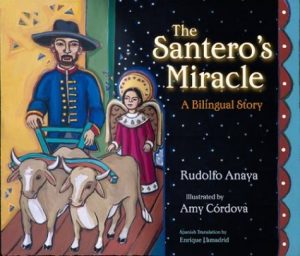 In this bilingual story of faith, Don Jacobo has a dream that, in the end, is a reminder that miracles do happen. Jacobo is teaching his visiting grandson Andrés how to become a santero. Christmas is coming, snow is falling in the village, and the two are working on a carving of San Isidro, the patron saint of farmers. The half-finished carving stands in the living room beside the two oxen and the angel that don Jacobo carved earlier in the month. The snow-covered mountains are beautiful, but the road to the village is impassable. Andrés’s parents will not be able to get to the house for the holiday, and Jacobo’s neighbor Leopoldo is desperately ill but cannot get to the hospital. Then comes Jacobo’s dream; San Isidro is plowing with the two oxen and the angel is helping. \”But we don’t plow ’til April\” don Jacobo muses upon awakening. \”What does it mean?\” The night had been bitterly cold and don Jacobo must bundle up to go to the barn to feed his cows and chickens. As he steps outside, he can hardly believe his eyes. The snow-packed road is clear. Rudolfo Anaya’s story of the power of faith, hope, and love will be enjoyed by readers of all ages.
In this bilingual story of faith, Don Jacobo has a dream that, in the end, is a reminder that miracles do happen. Jacobo is teaching his visiting grandson Andrés how to become a santero. Christmas is coming, snow is falling in the village, and the two are working on a carving of San Isidro, the patron saint of farmers. The half-finished carving stands in the living room beside the two oxen and the angel that don Jacobo carved earlier in the month. The snow-covered mountains are beautiful, but the road to the village is impassable. Andrés’s parents will not be able to get to the house for the holiday, and Jacobo’s neighbor Leopoldo is desperately ill but cannot get to the hospital. Then comes Jacobo’s dream; San Isidro is plowing with the two oxen and the angel is helping. \”But we don’t plow ’til April\” don Jacobo muses upon awakening. \”What does it mean?\” The night had been bitterly cold and don Jacobo must bundle up to go to the barn to feed his cows and chickens. As he steps outside, he can hardly believe his eyes. The snow-packed road is clear. Rudolfo Anaya’s story of the power of faith, hope, and love will be enjoyed by readers of all ages.
Americas Award For Children’s And Young Adult Literature. Commended (Awards)
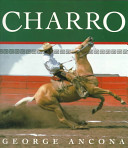
Charro is the Mexican term for horseman, but for a Mexican a charro is much more than a cowboy. A skilled rider of horses and bulls and bucking broncos, an artist with a lariat, and a model of gentlemanly dress and behavior, the charro is also a living symbol of Mexico’s patriotic past. In the rodeo-like sport called la charrería, male charros and female charras, children and adults, show off their skill and daring. But more than that they are showing off their pride in their country–because to be a charro is to be a Mexican.
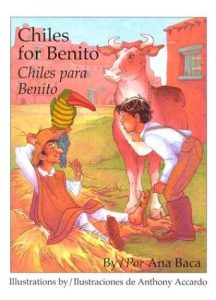 This charming bilingual fable explains the origins of the all-important chile Chiles ristras adorn the kitchen and dishes all over New Mexico. In the winter, when the nights grow longer and the winds blow stronger, chiles season meats and stews bringing New Mexico spice to every hungry taste bud. But chiles didn’t always grow in New Mexico, and Ana Baca tells a special fable about Benito and the chiles that crawled all over his family’s simple homestead. Benito’s mother sends him to the country fair in the hopes of their cow winning the first place prize. This would give them money to buy some seeds for the crop, but the cow misbehaves and they must leave the fair. Suddenly, Benito is stopped by a mysterious man with a peculiar bird on his shoulder. The man offers Benito some powerful seeds in exchange for his cow, which Benito quickly accepts. But when only uncontrollable weeds grow from the ground, Benito begins to feel foolish. The neighboring farmers begin to complain that the relentless weeds are killing their crop. How will the community survive? Will the rapidly growing weeds ever bear fruit for Benito?
This charming bilingual fable explains the origins of the all-important chile Chiles ristras adorn the kitchen and dishes all over New Mexico. In the winter, when the nights grow longer and the winds blow stronger, chiles season meats and stews bringing New Mexico spice to every hungry taste bud. But chiles didn’t always grow in New Mexico, and Ana Baca tells a special fable about Benito and the chiles that crawled all over his family’s simple homestead. Benito’s mother sends him to the country fair in the hopes of their cow winning the first place prize. This would give them money to buy some seeds for the crop, but the cow misbehaves and they must leave the fair. Suddenly, Benito is stopped by a mysterious man with a peculiar bird on his shoulder. The man offers Benito some powerful seeds in exchange for his cow, which Benito quickly accepts. But when only uncontrollable weeds grow from the ground, Benito begins to feel foolish. The neighboring farmers begin to complain that the relentless weeds are killing their crop. How will the community survive? Will the rapidly growing weeds ever bear fruit for Benito?
An award-winning title now available in Spanish
Born in 1927 in Yuma, Arizona, César Chavez lived the hard-scrabble life of a migrant worker during the Depression. Although his mother wanted him to get an education, César left school after eighth grade to work. He grew to be a charismatic leader and founded the National Farm Workers Association, an organization that fought for basic rights for farm workers. In powerful poems and dramatic stylized illustrations, Carmen T. Bernier-Grand and David Díaz pay tribute to Chavez’s legacy helping migrant workers improve their lives by doing things by themselves for themselves.
A bilingual picture book offers up a celebration of a kitchen where mom has just pulled out the large stew pot to begin a fabulous vegetable soup and all the kids are invited to help.
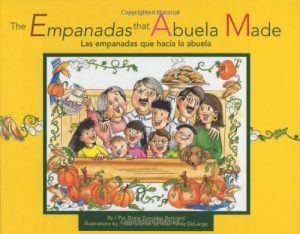 A sweet bilingual story about a family tradition. Baking is always a treat, particularly when you throw family and fun into the mix. In this whimsical look at the making of empanadas, popular children’s author Gonzales Bertrand serves up the festive fun of a family’s effort to concoct the delicious pastries. In the tradition of popular rhymes like “The Old Lady Who Swallowed a Fly,” the laughter and fun rise from page to page. The Empanadas that Abuela Made/Las empanadas que Abuela hacía is filled with humorous cooks and family: Abuela, Abuelo, the cousins, aunts, uncles, and even the family dog join the parade of fluttering flour and swirling sugar. Alex Pardo de Lange fills the pages with offbeat illustrations of blankets of dough and dancing rolling pins.
A sweet bilingual story about a family tradition. Baking is always a treat, particularly when you throw family and fun into the mix. In this whimsical look at the making of empanadas, popular children’s author Gonzales Bertrand serves up the festive fun of a family’s effort to concoct the delicious pastries. In the tradition of popular rhymes like “The Old Lady Who Swallowed a Fly,” the laughter and fun rise from page to page. The Empanadas that Abuela Made/Las empanadas que Abuela hacía is filled with humorous cooks and family: Abuela, Abuelo, the cousins, aunts, uncles, and even the family dog join the parade of fluttering flour and swirling sugar. Alex Pardo de Lange fills the pages with offbeat illustrations of blankets of dough and dancing rolling pins.